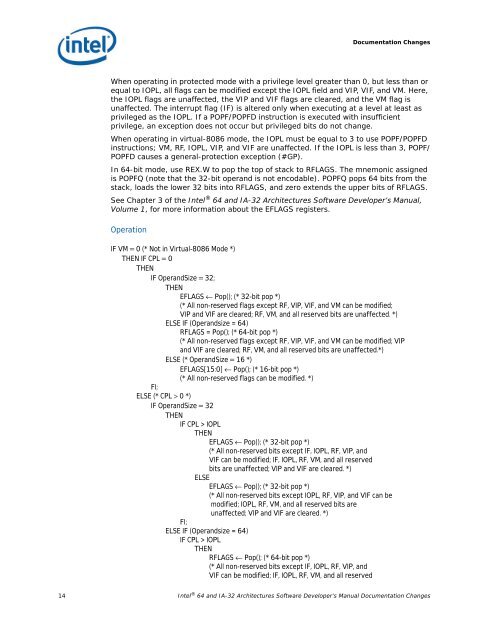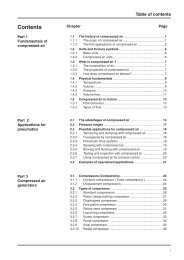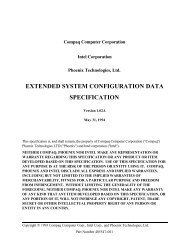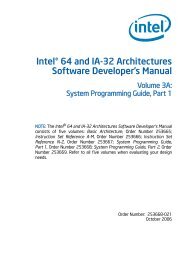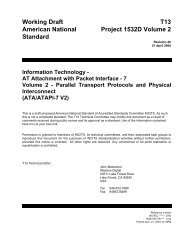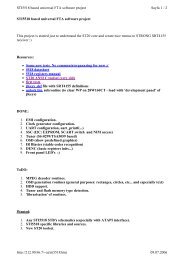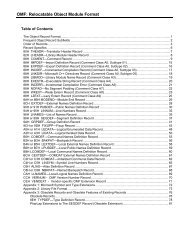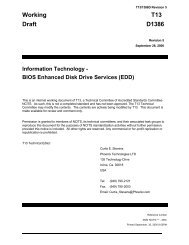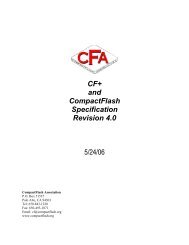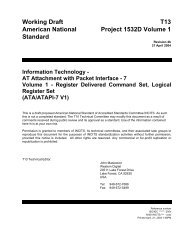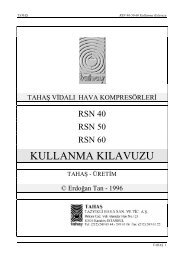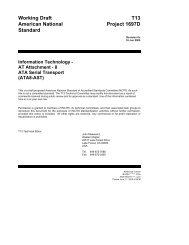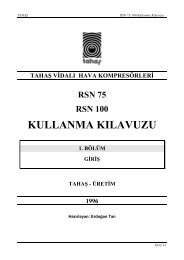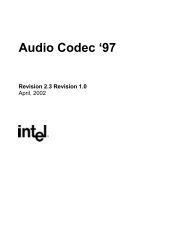Intel 64 and IA-32 Architectures Software Developer's Manual
Intel 64 and IA-32 Architectures Software Developer's Manual
Intel 64 and IA-32 Architectures Software Developer's Manual
Create successful ePaper yourself
Turn your PDF publications into a flip-book with our unique Google optimized e-Paper software.
Documentation Changes<br />
When operating in protected mode with a privilege level greater than 0, but less than or<br />
equal to IOPL, all flags can be modified except the IOPL field <strong>and</strong> VIP, VIF, <strong>and</strong> VM. Here,<br />
the IOPL flags are unaffected, the VIP <strong>and</strong> VIF flags are cleared, <strong>and</strong> the VM flag is<br />
unaffected. The interrupt flag (IF) is altered only when executing at a level at least as<br />
privileged as the IOPL. If a POPF/POPFD instruction is executed with insufficient<br />
privilege, an exception does not occur but privileged bits do not change.<br />
When operating in virtual-8086 mode, the IOPL must be equal to 3 to use POPF/POPFD<br />
instructions; VM, RF, IOPL, VIP, <strong>and</strong> VIF are unaffected. If the IOPL is less than 3, POPF/<br />
POPFD causes a general-protection exception (#GP).<br />
In <strong>64</strong>-bit mode, use REX.W to pop the top of stack to RFLAGS. The mnemonic assigned<br />
is POPFQ (note that the <strong>32</strong>-bit oper<strong>and</strong> is not encodable). POPFQ pops <strong>64</strong> bits from the<br />
stack, loads the lower <strong>32</strong> bits into RFLAGS, <strong>and</strong> zero extends the upper bits of RFLAGS.<br />
See Chapter 3 of the <strong>Intel</strong> ® <strong>64</strong> <strong>and</strong> <strong>IA</strong>-<strong>32</strong> <strong>Architectures</strong> <strong>Software</strong> Developer’s <strong>Manual</strong>,<br />
Volume 1, for more information about the EFLAGS registers.<br />
Operation<br />
IF VM = 0 (* Not in Virtual-8086 Mode *)<br />
THEN IF CPL = 0<br />
THEN<br />
IF Oper<strong>and</strong>Size = <strong>32</strong>;<br />
THEN<br />
EFLAGS ← Pop(); (* <strong>32</strong>-bit pop *)<br />
(* All non-reserved flags except RF, VIP, VIF, <strong>and</strong> VM can be modified;<br />
VIP <strong>and</strong> VIF are cleared; RF, VM, <strong>and</strong> all reserved bits are unaffected. *)<br />
ELSE IF (Oper<strong>and</strong>size = <strong>64</strong>)<br />
RFLAGS = Pop(); (* <strong>64</strong>-bit pop *)<br />
(* All non-reserved flags except RF, VIP, VIF, <strong>and</strong> VM can be modified; VIP<br />
<strong>and</strong> VIF are cleared; RF, VM, <strong>and</strong> all reserved bits are unaffected.*)<br />
ELSE (* Oper<strong>and</strong>Size = 16 *)<br />
EFLAGS[15:0] ← Pop(); (* 16-bit pop *)<br />
(* All non-reserved flags can be modified. *)<br />
FI;<br />
ELSE (* CPL > 0 *)<br />
IF Oper<strong>and</strong>Size = <strong>32</strong><br />
THEN<br />
IF CPL > IOPL<br />
THEN<br />
EFLAGS ← Pop(); (* <strong>32</strong>-bit pop *)<br />
(* All non-reserved bits except IF, IOPL, RF, VIP, <strong>and</strong><br />
VIF can be modified; IF, IOPL, RF, VM, <strong>and</strong> all reserved<br />
bits are unaffected; VIP <strong>and</strong> VIF are cleared. *)<br />
ELSE<br />
EFLAGS ← Pop(); (* <strong>32</strong>-bit pop *)<br />
(* All non-reserved bits except IOPL, RF, VIP, <strong>and</strong> VIF can be<br />
modified; IOPL, RF, VM, <strong>and</strong> all reserved bits are<br />
unaffected; VIP <strong>and</strong> VIF are cleared. *)<br />
FI;<br />
ELSE IF (Oper<strong>and</strong>size = <strong>64</strong>)<br />
IF CPL > IOPL<br />
THEN<br />
RFLAGS ← Pop(); (* <strong>64</strong>-bit pop *)<br />
(* All non-reserved bits except IF, IOPL, RF, VIP, <strong>and</strong><br />
VIF can be modified; IF, IOPL, RF, VM, <strong>and</strong> all reserved<br />
14 <strong>Intel</strong> ® <strong>64</strong> <strong>and</strong> <strong>IA</strong>-<strong>32</strong> <strong>Architectures</strong> <strong>Software</strong> Developer’s <strong>Manual</strong> Documentation Changes


